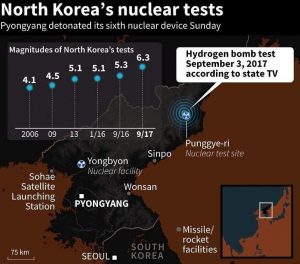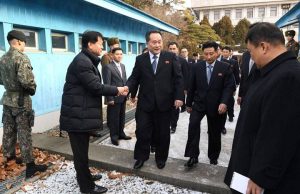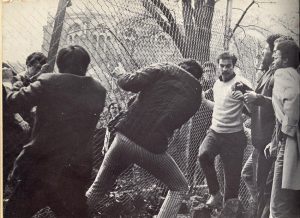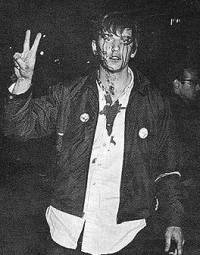Podcast: Play in new window | Download
North and South Korea Diplomacy
In a historic diplomatic break-through the leaders of North Korea and South Korea met earlier this month. The North Korean leader Kim Jung-Un promised to give up his country’s nuclear weapons declaring that its not necessary to have them if the United States formally ends it’s provocations and promises not to launch any military aggression against his country. He promised that North Korea will dismantle is nuclear test site in Punggye-ri in May.
The Korean War which began in 1950 came to an end in 1953. An armistice was signed but peace was never officially declared and the two countries have been officially at war ever since.
This state of affairs will hopefully be resolved. At the meeting, South Korean President Moon Jae-in embraced North Korean leader Kim Jong-un after signing the Panmunjom Declaration for Peace, Prosperity, and Unification of the Korean Peninsula.
Guest – Attorney Jim Lafferty is one of the leaders of the anti-Vietnam War movement and has remained a peace activist for five decades. Jim Lafferty is currently the head of the Los Angeles chapter of the National Lawyers Guild and an organizer of and speaker at last week’s Los Angeles teach-in on the Korean situation.
—-
Columbia University Protests of 1968: Fifty Years Later
1968 was a momentous year. Huge historical events happened in the USA, Latin America, Europe, and Asia fifty years ago that shaped the course of history.
In France the students and workers came close to overthrowing capitalism in an advance capitalist country.
In Eastern Europe the Czechoslovakian people would’ve installed a democratic socialism, what they called socialism with a human face, but for the intervention by the power of Soviet Union which sent in troops to crush the uprising.
In Vietnam, the American war effort to prevent the Vietnamese people from determining their own destiny showed the world to be a losing proposition by the Tet Offensive. The Vietnamese National Liberation Front and the Hanoi coordinated military strikes throughout the south of their country, temporarily took over the southern capital of Saigon including the American Embassy.
Martin Luther King Jr. was assassinated in Memphis, Tennessee on April 4, 1968 provoking rebellion in the inner cities of the USA. Two weeks later the students, both black and white, rose up at Columbia University in New York City.
The African-American students demanded that the university stop encroaching in neighboring Harlem, where the university was planning to build a gymnasium for its students in a public park. They took over Hamilton Hall, a classroom building on the campus and received wide support from the Harlem community. The white students supported this demand. They took over four other buildings, including the administration building (Lowe Library) demanding that the University end its complicity in doing research that supported the American imperial war in Vietnam.
After a week of the student occupation, the New York City Police on behalf of the administration descended on the campus, violently beat the students, and arrested some 700 of them. They were defended by members of the National Lawyers Guild. After the arrests, the students went on strike. In the end the university’s complicity with the war in Vietnam and it’s landgrab in Harlem were ended.
Guest – Attorney Eleanor Stein, she was a law student at Columbia at the time and a participant in the student strike. She teaches a course called the Law of Climate Change: Domestic and Transnational at Albany Law School and SUNY Albany, in conjunction with the Environmental and Atmospheric Sciences Department at SUNY. Eleanor Stein is teaching transnational environmental law with a focus on catastrophic climate change. For ten years she served as an Administrative Law Judge at the New York State Public Service Commission in Albany, New York, where she presided over and mediated New York’s Renewable Portfolio Standard.
Guest – Professor Stefan Bradley whose primary research area is recent African-American history. He is the author of Harlem versus Columbia University: Black Student Power in the Late 1960s. Professor Bradley teaches at Loyola Marymount University in Los Angeles and is the chairperson of the African American studies department. He was a much appreciated participant in last weeks conference on the Columbia strike.
—————————————-



